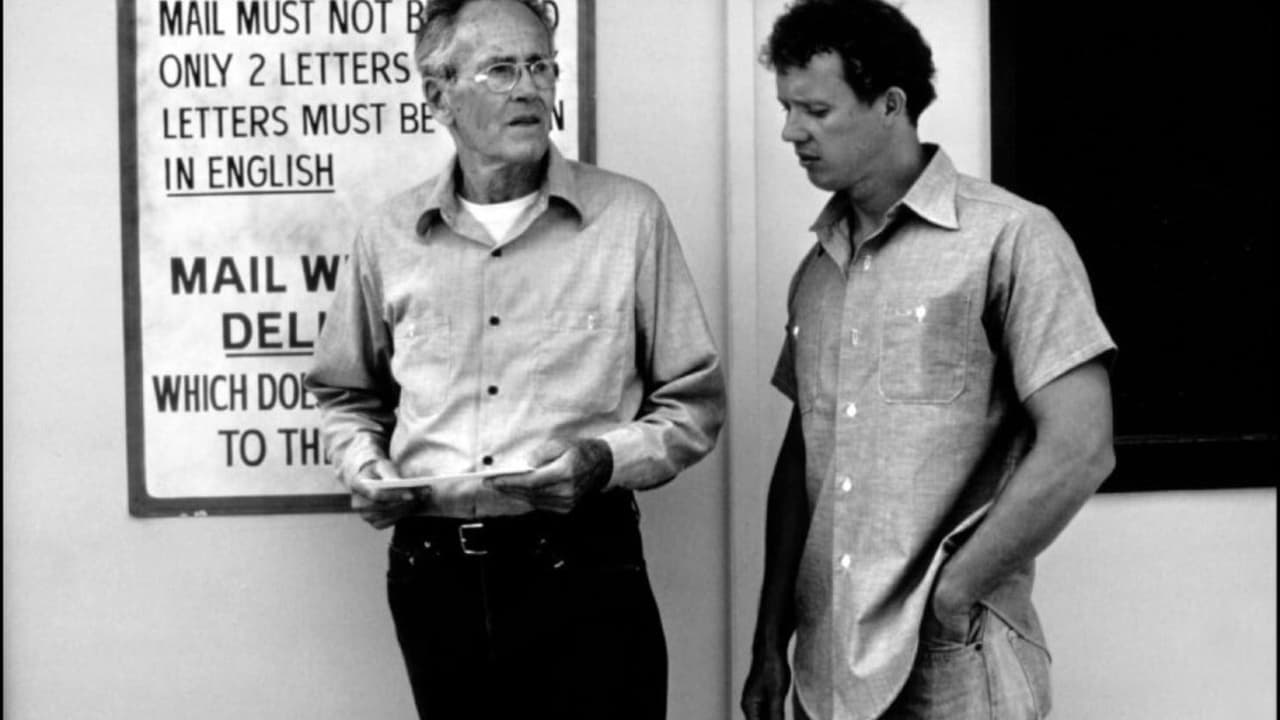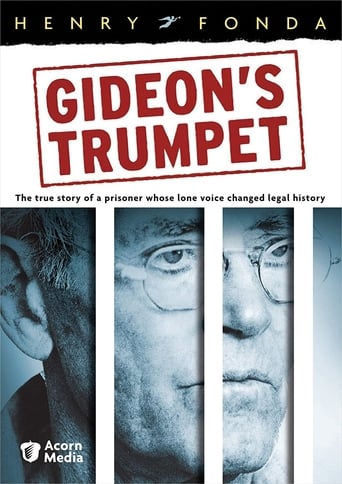

Wonderful character development!
... View MoreThe thing I enjoyed most about the film is the fact that it doesn't shy away from being a super-sized-cliche;
... View MoreThe film's masterful storytelling did its job. The message was clear. No need to overdo.
... View MoreStory: It's very simple but honestly that is fine.
... View MoreIt's the power of Henry Fonda's performance that turns Gideon's Trumpet, the true story of how the right to counsel for all criminal suspects was guaranteed by the United States Supreme Court, into something a bit more than a cheapjack made-for-TV movie. Fonda has enough sense to make Clarence Gideon something less than a hero. Gideon is an intelligent ne'er-do-well, and the viewer grows to dislike him despite his importance in our judicial history. We want him to win, but we certainly don't want him in our house.I don't know if columnist Anthony Lewis' book of the same name has Gideon as, well, as ucky as in the movie, but Fonda, toward the end of his life, seemed unhappy and defeated, and it made his portrayal of Clarence Earl Gideon totally acceptable and believable.The rest of Gideon's Trumpet is ordinary for TV, thrown-together and dumbed-down. John Houseman's misplaced weight behind the production--and his awful miscasting of himself as Earl Warren-- leave the movie feeling washed out and ready for a high school civics class.Except for Fonda, and Mel Ferrer's portrayal as Abe Fortas, we never really buy into the movie. Like the justices themselves, we are nothing much more than intellectual observers.A shame.
... View MoreThe story of Clarence Earl Gideon illustrates the fact that even the humblest and least noble of people in the right circumstances can influence things far beyond their grasp. Gideon was certainly in humble circumstances and was not a noble character by any means.But what he was entitled to is to be represented by counsel when he was arrested for a robbery of a pool hall in a small town in Florida. Gideon was no stranger to the criminal justice system, he'd served time for numerous minor offenses before. But his efforts to defend himself without an attorney resulted in his conviction.What Gideon did was appeal directly to the US Supreme Court and they took his case and Gideon won the right to be retried with a court appointed lawyer. It was also a 9-0 decision, not something arrived at every day in important cases.Henry Fonda plays Gideon and the Seventies were not a good decade for him on screen. He sold the value of his box office name for the money and appeared in a lot of junk quite frankly. Until his final Oscar on the big screen for On Golden Pond, this Hallmark Hall of Fame television drama was probably Fonda's best work in the Seventies and might have been his epitaph, but for that. You can see this man clearly as someone who forty years earlier might well have been Tom Joad.Abe Fortas who represented Fonda at the Supreme Court is played by Jose Ferrer and Ferrer even looks like Fortas who was the consummate Washington insider. His later downfall doesn't change the fact that his was one of the most brilliant legal minds of the last century. On the local level Fonda as Gideon is represented finally in court by Lane Smith who plays his attorney in the folksy Ben Matlock style popularized by Andy Griffith.The Supreme Court who is nameless has such folks as Sam Jaffe and Dean Jagger on the bench and the Chief Justice is John Houseman. Of course the Chief Justice was Earl Warren and Houseman plays it more like his law professor Kingsley in The Paper Chase. Earl Warren was a far more down to earth individual than Houseman ever was on screen and in real life. Making her farewell appearance as Fonda's landlady is Fay Wray, she of the big ape. She gives testimony at his new trial she wasn't allowed to give at the first travesty. The right to counsel is a sacred one and the Supreme Court has made it so by the humble pleadings of one of the Creator/Deity's lesser creations in Clarence Earl Gideon. Greatness can and does exist in some strange places.
... View MoreIn another review, I stated that the "Hallmark Hall of Fame" series was never as good during the last twenty years or so as it had been during its glorious days in the 1950's and '60's. There was one brilliant exception, however, and this is it. "Gideon's Trumpet" can stand up proudly alongside all the other "Hall of Fame" episodes of the past as one of the finest made-for TV films ever made.It tells the true story of Clarence Earl Gideon, an ex-convict who, in the early 1960's, was accused of breaking into and robbing a convenience store in Florida. Claiming innocence, he was forced to serve as his own lawyer because states' laws at that time did not require an accused person to be automatically given a lawyer. Failing miserably at his own defense, he was sent to prison, where, as a model prisoner, he studied up on law and petitioned the U.S. Supreme Court for the right to be granted a lawyer.This phrase has already become a cliché from overuse, but Henry Fonda, in one of his last performances, does not play Clarence Gideon--he IS Clarence Gideon. He inhabits the role so completely that we never believe we are watching Henry Fonda; we believe we are seeing a poor, inarticulate, awkward, somewhat cranky, but basically kind man named Clarence Gideon. Fonda utterly lives the role in a way that he seldom does in his other films (although he was an excellent actor).The other actor who gives a memorable performance is José Ferrer, as Abe Fortas, who pleads Fonda's petition before the Supreme Court. As Fortas, Ferrer gets to do one of the things he does best, and which he had not done to my knowledge since playing "Cyrano de Bergerac"--deliver a long, impressive speech. I don't know how much of the speech was actually taken from the Court hearing and how much was written by the excellent screenwriters, but there are few things as satisfying as an actor who not only gives a great performance, but also delivers a long speech beautifully. The thrill of hearing Ferrer's rich, beautiful voice argue a case before the Supreme Court is enough reason for me to tune in to this film every time it is shown on TV.There is also a cameo from Fay Wray, as Fonda's longtime landlady, and the other Justices of the Court, all of whom are also excellent, consist of such familiar faces as John Houseman, Sam Jaffe, Dean Jagger, and other familiar character actors from television.This great production might strike some viewers brought up only on action films as boring--there is no action at all in it; it's like watching a filmed play--but, believe me, there is not a single boring moment in it, if you appreciate well-written characters and dialogue. And this film avoids all of the drippy sentiment that has plagued "Hallmark Hall of Fame" over the last six years or so. If only this anthology series had stayed on the level of "Gideon's Trumpet".
... View MoreJust saw this this morning. It was well done, but I think dumbed down for general consumption. It was painful to hear so many distinguished jurists referring to attorneys or counsel as 'lawyers', as if the public wouldn't know to what they were referring. At least in the high court, they did use the proper nomenclature. Fonda did a good job of playing Gideon, although I believe the actual man was only about 50 at the time. He also made him out to be at the same time sympathetic and the unpleasant indignant multiple felon he likely was in reality.
... View More